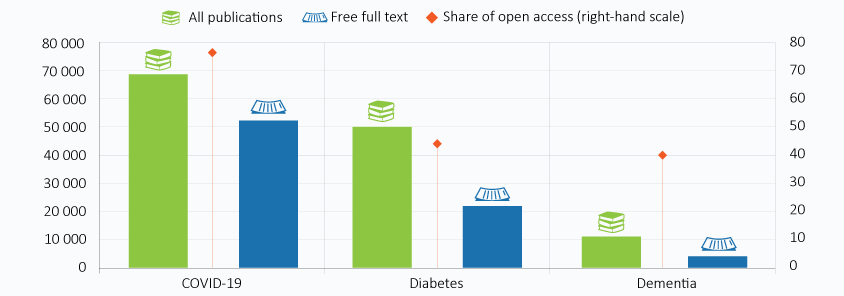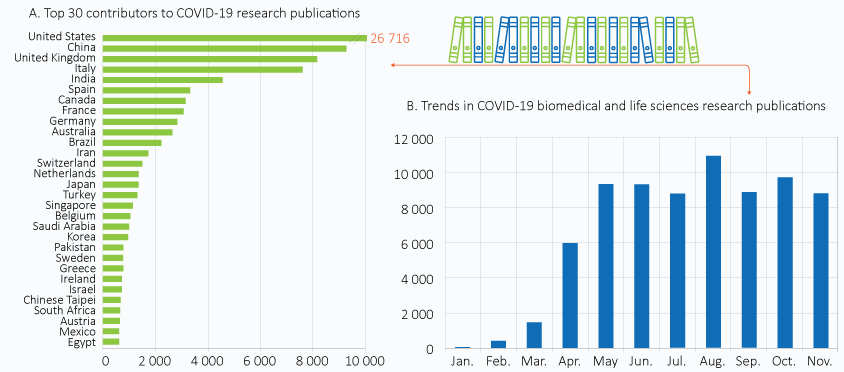Times of crisis and opportunity
The pandemic has triggered an unprecedented mobilisation of the scientific community
Around 75 000 scientific publications on COVID-19 were published between January and November 2020, of which more than three-quarters were open access, compared to less than one-half in other biomedical fields (see figure). The United States accounts for the largest share, followed by China and the United Kingdom (Figure 3). Research databases and scientific publishers removed paywalls so that the scientific community could quickly share COVID-19-related data and publications. Pre-prints (academic papers that have yet to be peer reviewed or published) have become more common in the medical research field, allowing for the faster diffusion of scientific findings, but also raising risks around quality assurance. These developments mark important changes that could accelerate the transition to a more open science in the longer run.
Open access of COVID-19, Diabetes and Dementia publications, January-October 2020
Total and free full text PubMed publications

Source: OECD calculations based on US National Institutes of Health PubMed data, https://pubmed.ncbi.nlm.nih.gov, (accessed 30 October 2020). StatLink https://doi.org/10.1787/888934223289
The United States accounts for the largest share, followed by China and the United Kingdom (see figure). Research databases and scientific publishers removed paywalls so that the scientific community could quickly share COVID-19-related data and publications. Pre-prints (academic papers that have yet to be peer reviewed or published) have become more common in the medical research field, allowing for the faster diffusion of scientific findings, but also raising risks around quality assurance. These developments mark important changes that could accelerate the transition to a more open science in the longer run.
Growth in COVID-19 related publications, 1st January - 30 November
Total and free full text PubMed publications

Source: OECD and OCTS-OEI calculations, based on US National Institutes of Health PubMed data, https://pubmed.ncbi.nlm.nih.gov (accessed 30 November 2020). StatLink https://doi.org/10.1787/888934223251
Beyond their research activities, scientists have been called upon to provide expert input on public health and other policy responses to the pandemic. They have had to communicate evidence that is unavoidably incomplete and changing, and to do so in ways that promote public confidence and trust. For various reasons, however, scientific advice to policy makers and the public is increasingly contested, even as governments continue to face new waves of the pandemic. This requires governments to carefully communicate uncertainties, provide a balanced presentation of potential scenarios and be transparent about mistakes. They should also ensure that policies are developed with input from many different types of expertise, including from the social sciences.
- Governments acted quickly to fund COVID-19-related research and innovation at scale
- The pandemic has triggered an unprecedented mobilisation of the scientific community
- Despite the disruption, scientists have continued their work during the crisis
- Responses to the crisis have drawn upon the innovative potential of businesses
- Business research and innovation have been impacted unevenly by the crisis
- Much of the research and innovation response to COVID-19 has been international
‹ Homepage
Related Documents
- Postgraduate training regimes need reforming to support a diversity of career paths
- Responses to the crisis have drawn upon the innovative potential of businesses
- Growing government debt could lead to austerity, and some hard choices for research and innovation policy
- Government R&D expenditures may need to shift to reflect new priorities
- Much of the research and innovation response to COVID-19 has been international
- Business research and innovation have been affected unevenly by the crisis
- Building government capabilities to meet future challenges will be a major challenge in itself
- Global challenges require global solutions
- Despite the disruption, scientists have continued their work during the crisis
- The STI policy mix needs to be more targeted
- Governments acted quickly to fund COVID-19-related research and innovation at scale